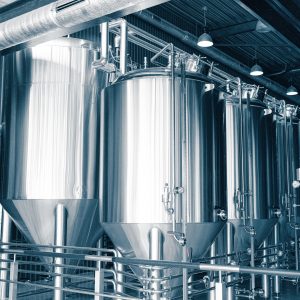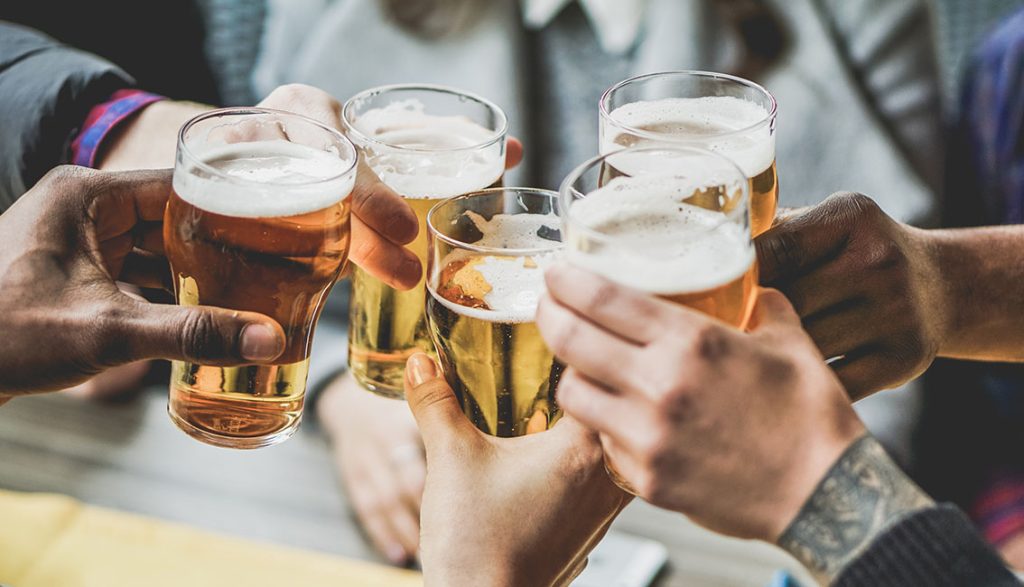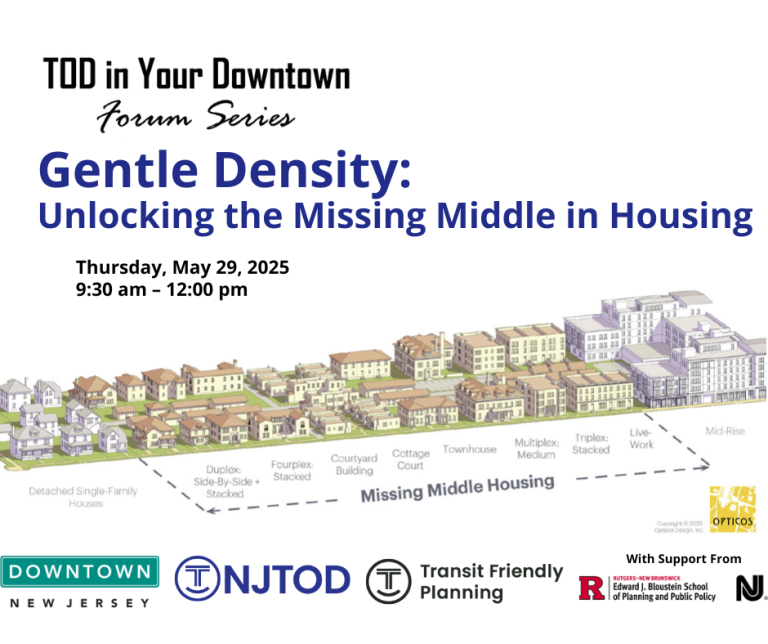Oppressive Regulations are Limiting NJ’s Brewery Boom
Abbie Galie
Lower Forge Brewery and Destination Medford
Gabe Bailer
Professional Planner, Harbor Associates
February 28, 2023

Craft brewing and distilling is a developing industry in the Garden State. But while New Jersey passed legislation in 2012 to allow tasting rooms, the restrictive nature of New Jersey Alcoholic Beverage Control (ABC) rules is hampering expansive growth.
A notable restriction imposed in 2012 is the requirement that each customer receive a “tour before pour”, forcing breweries to give an educational tour with a question and answer period to each customer consuming beer on the premise. Breweries are also prohibited from making or serving prepared food. With limitations on “de minimus” snacks within ABC regulations, breweries may only sell pre-packaged goods such as bags of chips, beef jerky, and snack pretzels. This is an unusual arrangement since the safe service training that New Jersey requires of serving staff almost universally opens with slides explaining that a customers should be offered food or snacks to help prevent over-consumption.
 Breweries are only permitted to sell what they make on-premises within their sampling rooms, and they are only allowed to make beer and malted grain beverages as defined by federal law. This is why you’re unable to find the popular hard cider varieties at your local Garden State brewery – ciders are a fruit-based, grain-free beverage defined separately within federal and state laws. In New Jersey, only licensed wineries are able to share these trending beverages with their customers.
Breweries are only permitted to sell what they make on-premises within their sampling rooms, and they are only allowed to make beer and malted grain beverages as defined by federal law. This is why you’re unable to find the popular hard cider varieties at your local Garden State brewery – ciders are a fruit-based, grain-free beverage defined separately within federal and state laws. In New Jersey, only licensed wineries are able to share these trending beverages with their customers.
The rules seem arbitrary and strict, especially compared to neighboring states where they have requirements that any alcohol-based business serve food, again lessening the chance of over-consumption and the risks of drinking on an empty stomach.
Luckily, these rules did not deter approximately 140 breweries from opening in our state since the first law was passed. In 2018, however, the ABC issued a special ruling that further restricted breweries privileges. Under this ruling, breweries were:
 limited to 25 events annually (e.g., trivia nights, yoga, open mic, musicians, dog adoption events, paint & sips, book signings, and even turning on the television to show a sports game or television show/movie);
limited to 25 events annually (e.g., trivia nights, yoga, open mic, musicians, dog adoption events, paint & sips, book signings, and even turning on the television to show a sports game or television show/movie);- required to have an employee oversee outdoor seating (a brewery employee must be watching customers in the seating area at all times, however, this employee is not permitted to offer refills, carry beer to your table, take orders, or interact with customers); and
- precluded from offering happy hours or give discounts of any kind.
So how does this play out?
No Coke for you! No Sprite, juice boxes, or soft drinks of any kind. Breweries are not allowed to sell drinks from any commercial brands. They are only allowed to sell beverages that they make on the premise. Good luck if you are a designated driver, or bringing a child with you.
 So, the brewery wants to use one their 25 events to show the big football game on tv or host a trivia night on a quiet Thursday evening? They must provide the ABC with 10 business days advance notice; then once approved, the municipality’s police chief and township clerk need to sign off as well. The brewery must also provide additional security for the event. In addition to all these rules, the brewery must maintain records for five years of who attended, and the state reserves the right to ask for the guest list at any time.
So, the brewery wants to use one their 25 events to show the big football game on tv or host a trivia night on a quiet Thursday evening? They must provide the ABC with 10 business days advance notice; then once approved, the municipality’s police chief and township clerk need to sign off as well. The brewery must also provide additional security for the event. In addition to all these rules, the brewery must maintain records for five years of who attended, and the state reserves the right to ask for the guest list at any time.
Who’s hungry? Typically, people enjoying alcoholic beverages will also consume food. While breweries can’t serve food, they typically partnered with local restaurants and food trucks to have a symbiotic relationship. The 2018 special ruling made it illegal to “fraternize” with food establishments, which means breweries can no longer partner with food trucks, distribute menus from local eateries, allow delivery drivers to deliver takeout to customers inside the premise, or even provide a paper plate or plastic fork to customers.
 The ABC did relax the tour requirement in the 2018 ruling. Breweries no longer need to provide a tour each customer prior to serving them. They are still required to do at least one tour per year, and must keep a record of who toured the facility and what employee conducted the tour.
The ABC did relax the tour requirement in the 2018 ruling. Breweries no longer need to provide a tour each customer prior to serving them. They are still required to do at least one tour per year, and must keep a record of who toured the facility and what employee conducted the tour.
The special ruling was put on hold through Covid shutdown, but unfortunately, made a comeback in 2022. Per the ABC, “by establishing a uniform set of standards that are applicable to all limited brewery licensees operating in this State, these licensees will be able to compete with each other on a level playing field”. Except it’s not a level playing field, some breweries are large and distribute widely across the state and into the region beyond our borders. Some are small, tap room focused businesses who sell the bulk of their product over the bar. The latter are experience-based businesses that depend on visitation to sell their product, which is severely hampered by these rules.
 This is not a one size fits all situation. The ABC maintains that the rules are an attempt to balance the concerns of the 6,000 retail licenses in New Jersey against the 140 limited brewery licensees. The argument is that the retail bar license has special privileges, such as hosting events, private parties, serving food, sharing events on social media, etc., that breweries should not have. How is music and entertainment a bar specific privilege? Yes, a bar license costs considerably more than a brewery license, however, that license comes with the privilege of owning a fluctuating asset that can be resold, as well as the ability to sell products that were not manufactured on-sight. While a brewery license is only a few thousand dollars annually, it also requires the purchase of brewing equipment, which can start at a half-million dollars for even the smallest brewers.
This is not a one size fits all situation. The ABC maintains that the rules are an attempt to balance the concerns of the 6,000 retail licenses in New Jersey against the 140 limited brewery licensees. The argument is that the retail bar license has special privileges, such as hosting events, private parties, serving food, sharing events on social media, etc., that breweries should not have. How is music and entertainment a bar specific privilege? Yes, a bar license costs considerably more than a brewery license, however, that license comes with the privilege of owning a fluctuating asset that can be resold, as well as the ability to sell products that were not manufactured on-sight. While a brewery license is only a few thousand dollars annually, it also requires the purchase of brewing equipment, which can start at a half-million dollars for even the smallest brewers.
Change is desperately needed!
New Jersey is the most densely populated state in our nation; however, we remain low on the list of breweries per capita with our mere 140 breweries place us 45th in the country. Our neighbors in New York and Pennsylvania each have nearly 500 breweries. It’s no coincidence that these neighboring states have much clearer and friendlier laws around liquor licenses in general.
Despite the antiquated liquor license laws, New Jersey has still seen an expansion in craft breweries over the last 12 years. Breweries have proven time and again that they are fantastic additions to the community. Not only do they create jobs, they provide a space for all ages of beer aficionados to enjoy. Breweries tend to be a magnet for other small businesses, especially when they’re located in downtowns and shopping districts.
The relatively low cost of their required licensing, which can offset the enormous capital costs of their equipment, allows for these breweries to open in a variety of areas and formats. You won’t find New Jersey’s breweries just in the wealthiest areas of the state, you can enjoy Garden State brews in almost every corner from High Point to Cape May. For instance, you’ll find breweries in mature downtowns like the Wet Ticket in Rahway and Yale Terrace in Cranford, industrial parks like the old staples of Kane and Carton, and in burgeoning small downtowns like Lower Forge in Medford or Kelly Green in Pitman. You’ll even find breweries in farming & rural locations like Source in Colts Neck and Screaming Hill in Cream Ridge.
So, while we continue to push for liquor license reform in New Jersey, let’s not forget the critical contribution of breweries to New Jersey’s economy and its downtowns’ vibrancy. It’s time New Jersey takes a holistic look at the economic development it is leaving on the table through its antiquated laws.
Gabe Bailer has been an NJ-licensed Professional Planner and a member of the American Institute of Certified Planners (AICP) since 2007. Gabe currently works for Harbor Consultants, a boutique planning, engineering, and surveying firm in his hometown of Cranford, specializing in municipal board consulting, redevelopment plans, ordinance and grant writing, and professional planning testimony. Besides being an avid beer drinker, Gabe writes for his blog NJ Urban Thinker, where his random planning ideas come to fruition.
Abbie Galie is a dedicated mother of four children and resident of Medford, NJ, which she has called home for the past 23 years. She is one of the founders of Medford’s first brewery, Lower Forge, an environmentally conscious brewery that sources 100% of its base malts from New Jersey farms and has zero spent grain heading to landfills. She is also the designer of all Lower Forge’s branding and marketing. Her love for keeping things local has her wearing many hats from being the principal cellist for the South Jersey Pops Orchestra, the founder of the local tourism media Destination Medford, the Vice President and Co-Founder of Medford’s Main Street Merchants business association, board member of Downtown NJ & Medford Business Association, and the former Chairwoman of Medford’s Economic Development Committee.


 limited to 25 events annually (e.g., trivia nights, yoga, open mic, musicians, dog adoption events, paint & sips, book signings, and even turning on the television to show a sports game or television show/movie);
limited to 25 events annually (e.g., trivia nights, yoga, open mic, musicians, dog adoption events, paint & sips, book signings, and even turning on the television to show a sports game or television show/movie);
